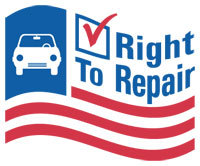Opinion : Now is the time for right-to-repair law
 |
May 18, 2009
Bob Barr, Ralph Nader
San Francisco Chronicle
Earlier this spring, in announcing the government's blueprint for saving the Big Three automakers, President Obama said, "The United States government will stand behind your (car) warranty." While it's unlikely many car owners would trust the federal government with an engine overhaul, a bipartisan bill has just been introduced in the House of Representatives that would in fact make it cheaper and easier for millions of consumers to have their cars repaired - the Right-to-Repair Act of 2009. While similar legislation has been introduced in previous Congresses but not voted on, it takes on additional urgency in these tough economic times, especially with the closing of many auto dealerships.
This aptly named bill would allow independent repair shops to compete for the business now guaranteed only to dealer-controlled establishments. This is important because car manufacturers now severely limit the number of repair shops that are allowed to have the tools, diagnostic codes and updated repair information essential to being able to repair late-model cars (which are heavily dependent on computers for performance and repair).
By thus unfairly limiting the universe of repair shops able to diagnose and repair late-model cars to only those repair shops that are connected with their dealers, the manufacturers dramatically limit consumer choice and significantly increase the costs to those car owners (by some 34 percent, according to a study preformed for the Automotive After Market Industry Association by Lang Research).
The most important thing the right-to-repair legislation does would be to require that car manufacturers make the tools and diagnostic information needed to repair their vehicles available to independent repair shops, on the same basis as to their dealer-operated shops. (The legislation expressly protects manufacturer trade secrets from public disclosure.) Its enactment would be a win for small business and for consumers at a time when both need a boost.
Why, then, has the bill failed earlier to win enactment, even though a more limited version of the legislation - relating to emissions-related systems - was passed nearly 20 years ago as part of the Clean Air Act amendments? Clearly, it's not because a significant majority of Americans do not prefer the freedom to have their car repaired at a business of their choice, including independent repair shops. More than 80 percent of younger drivers (those ages 18 to 34) favor such legislation, while older drivers favor it by a better than 70 percent margin, according to research by the Tarrance Group and Lake Research Partners.
Nor has the legislation failed to win passage because it is seen as a "Republican" or "Democratic" issue; more than 80 percent of those Americans polled recently who identify themselves as supporters of one of the two major parties favored the right-to-repair legislation (as did 78 percent of independent voters). The polling that uncovered such widespread support for the pro-competitive right-to-repair legislation was the combined, bipartisan efforts of Republican pollster the Tarrance Group and the Democratic pollster Lake Research Partners.
Of course, if nonpartisan support by a large majority of citizens was the primary basis for passing laws, the work product of Congress would look quite different.
Despite the bipartisan history of the legislation - first introduced in 2001 by Texas Republican Joe Barton and New York Democrat Edolphus Towns, and introduced the next year in the Senate by Republican Lindsey Graham with 11 co-sponsors - opposition from car manufacturers has effectively stymied its enactment.
Enhanced Democratic majorities in the Congress in the past two election cycles, along with heightened demands by consumers to have fair competition for car repairs, however, are likely to significantly improve the bill's prospects this 111th Congress.
Still, overcoming the institutional opposition by the manufacturers will make for a pitched battle in both houses.
The basic fairness, transparency and pro-competitive nature of this legislative proposal are hard to argue against. However, if for no other reason than the bill proposes to change the entrenched status quo, serious opposition is guaranteed. In the best of times, the right-to-repair proposal would be viewed as good legislation. In these troubled times for consumers, HR2057 should be considered as "must-pass."
Bob Barr is a former member of Congress from Georgia and was the Libertarian Party's nominee for president in 2008. Ralph Nader is a consumer advocate and the Green Party's candidate for president in 2008.


